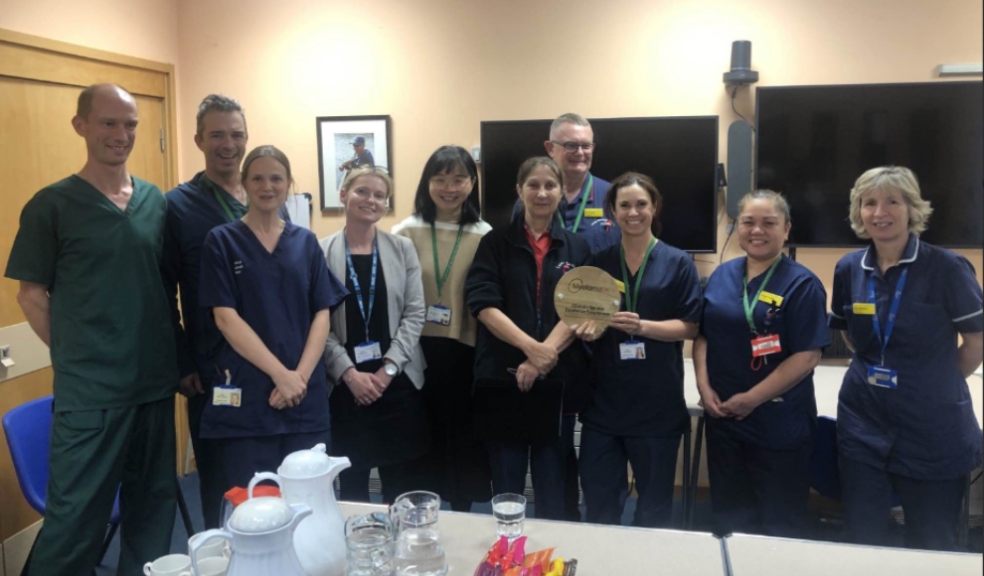
RD&E Hospital receives top cancer award
Royal Devon and Exeter Hospital has scooped a national award for its commitment to patients living with incurable blood cancer.
The hospital was presented today with the Myeloma UK Clinical Service Excellence Programme (CSEP) Award in recognition of its outstanding care and dedication to people with myeloma, an incurable blood cancer which claims the lives of 3,000 people in the UK each year.
Staff were praised for their efforts to improve patients’ quality of life and eagerness to listen to their needs.
The accolade, awarded by blood cancer charity Myeloma UK, recognises hospitals’ commitment to raising the bar for treatment and providing compassionate care.
Dawn Ridgeway, Haematology Clinical Nurse Specialist at Royal Devon and Exeter Hospital, said: “This award illustrates the hard work and dedication provided by the whole team. We are passionate about delivering individualised care, and supporting patients through the complexities and challenges they may face living with myeloma. We are very grateful to Myeloma UK for recognising our commitment to our patients and for their ongoing support.”
Myeloma is especially hard to spot as the symptoms are often vague and dismissed as ageing or other minor conditions.
By the time many patients are diagnosed their cancer has often advanced and they require urgent treatment. This can significantly impact their chances of survival and quality of life.
Monica Morris, Clinical Practice Programme Manager at Myeloma UK, said: “Myeloma is a challenging cancer which keeps coming back and can be really difficult to cope with both physically and mentally, so we were hugely impressed with the hospital’s efforts to ease patients’ burden.
“The team knows all too well the toll intensive treatment can take so they’ve created a prehabilitation programme to help patients get as fit as possible before a stem cell transplant. This not only prepares patients for what’s to come but gives them the best chance of a smooth recovery.
“Staff are also always on hand to lend an ear, offer advice at the monthly health and wellbeing clinic or signpost to other support services.
“Seeing each and every one of them go the extra mile day after day for people with myeloma is truly inspiring.”
Mark Theedom, from Crediton, was diagnosed with myeloma in November 2023 after he collapsed at home.
He was 63 years old.
By the time his cancer was caught his kidney function had plummeted to just 10 per cent.
He was told he had four months to live if he didn’t start treatment straight away.
Thankfully, nearly a year on, Mark is in full remission. The father-of-two has praised the team at Royal Devon and Exeter Hospital for supporting him through the rollercoaster of treatment and giving him the chance to walk his daughter down the aisle.
“They treat you like one big family,” said Mark, who works as a wheelchair repair specialist for the NHS. “When the consultant told me, ‘If you don’t start treatment, you have four months’, I started spurting out all the things I was worried I wouldn’t be there for. All these thoughts were coming out: this means I won’t get to see my grandkids or get to take my daughter down the aisle. It’s all the things a dad is thinking about. Am I going to be there?
“My specialist nurse Claire grabbed my hand and said, ‘We will look after you’. She is a lot smaller than me, but she gives the biggest hugs, and she always says, ‘Team hug, we’re part of a team. We’re going to get through it together’.
“They’ve all been outstanding. When I walk in, every time the receptionist says, ‘Good morning, Mark’. She’s got hundreds of patients, but she knows me by name. They all smile, ask how I am, how the wife is. It makes a difference.”
Myeloma occurs in the bone marrow and currently affects over 24,000 people in the UK.
It is a relapsing-remitting cancer, meaning that although many patients will experience periods of remission following treatment, the disease will inevitably return.
More than half of patients face a wait of over five months to receive the right diagnosis and around a third are diagnosed through A&E.
While it is incurable, myeloma is treatable in the majority of cases. Treatment is aimed at controlling the disease, relieving the complications and symptoms it causes, and extending and improving patients’ quality of life.
It all started in late 2023 when Mark was diagnosed with a UTI and given a course of antibiotics. He seemed to be on the mend when, one day, he stood up, felt suddenly dizzy and collapsed in his kitchen.
His GP suspected he’d had a mild heart attack and order an ECG and blood tests.
The ECG came back clear but the blood test results were alarming.
Mark was told to pack a bag and get to A&E as soon as he could. His kidney function had dropped to 10 per cent.
He was diagnosed with the incurable blood cancer myeloma on November 28, 2023.
“When the consultant says you have four months if you don’t start treatment that’s the hard part, you go into meltdown,” recalled the 64-year-old. “It took about two-three weeks to get over the shock.”
Mark received chemotherapy followed by a stem cell transplant.
The treatment has taken a toll and left him with hearing loss. But he is now in remission and steadily getting fitter and stronger every day.
While his kidney function will never be what it was, it’s now back up to 37 per cent.
“My hearing is not so good because of the side effects of treatment,” he explained. “It makes my brain a bit fuzzy and it takes a little while to process things. But I’m starting to get back to full fitness – I can tell there’s a big difference. I can walk a couple of miles and I’m not out of breath as much. But I’m still struggling with stairs.”
Thanks to the team at Royal Devon and Exeter Hospital, Mark has been able to get back to doing the things he loves, including spending a much-needed holiday in his static caravan in France.
“They made sure that I went and said, ‘We’ve got to get you on holiday’,” he said. “We needed a break from everything. It was perfect.”
Mark is determined to live a full life and make lasting memories with his family. He is already counting down the days until he gets to walk his daughter down the aisle.
“My consultant told me it might come back within 18 months, or it might be 10 years,” he added. “On average you get four to five years after a stem cell transplant. I will take that any day. My daughter is getting married in 2026 and I’ll be there, I will get to take her down the aisle.”


















